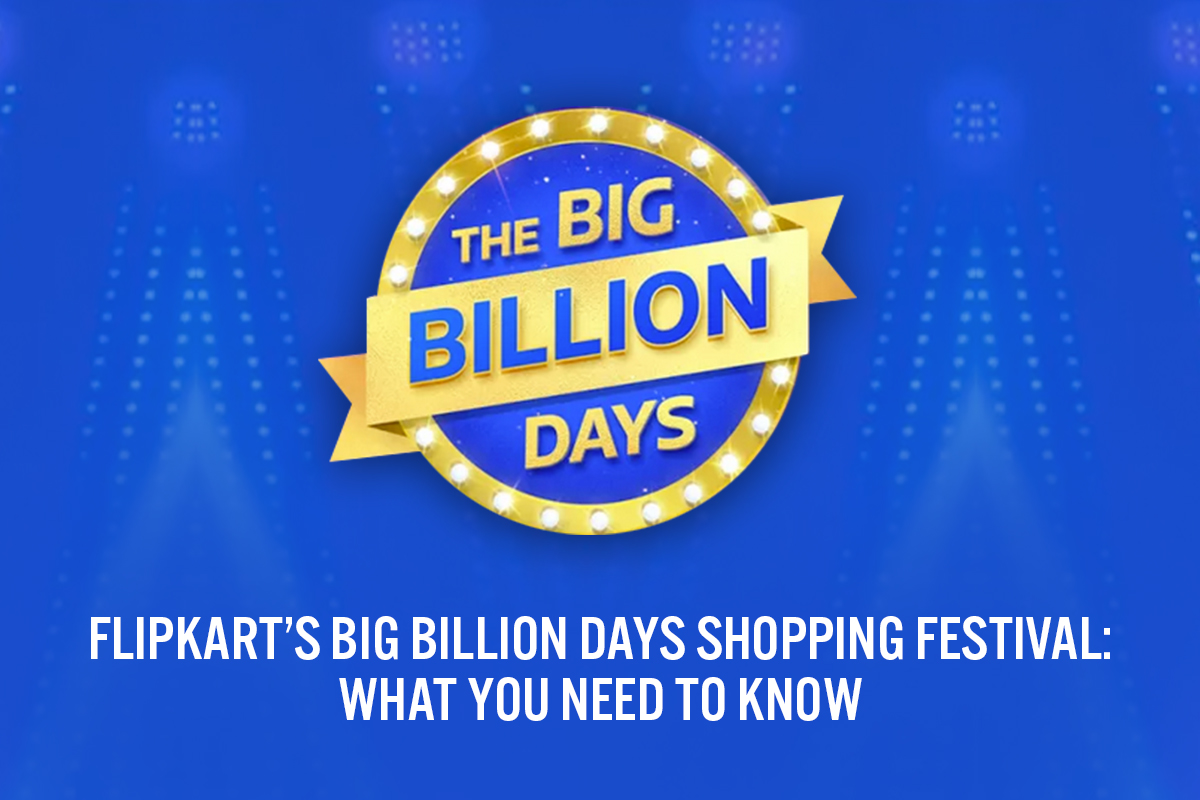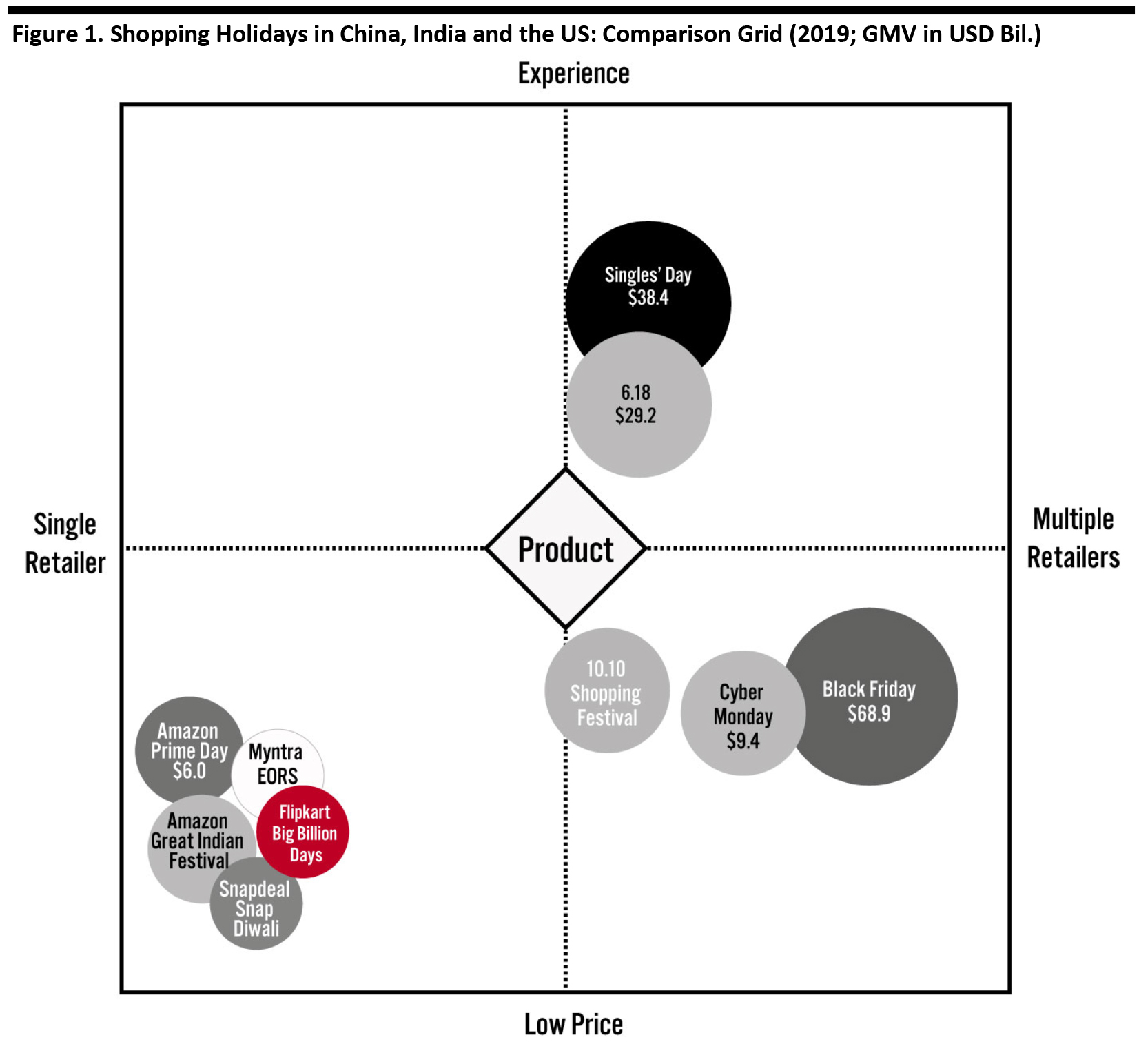
DIpil Das
What’s the Story?
Why It Matters
Big Billion Days is led by a single retailer and focuses on deep discounts, promotions on private label products and making products affordable to the mass consumer. Shopping holidays in China are a stark contrast, as they tend to be on a grander scale, with a focus on product and experience rather than low prices, as we depict in the chart in Figure 1. Several other Indian retailers, both online and offline, have their own shopping festivals during the festive sales period, both online and offline. The biggest online are being Amazon’s Great Indian Festival and Snapdeal’s Snap Diwali. Shopping festivals in India rake in sizeable GMV, although retailers generally do not publish these numbers. Instead, they tout the number of high-value items sold implying that a vast number of products are purchased during these festivals.- Flipkart claimed to have sold one in two television sets, one in three washing machines, one in five refrigerators and one in five air conditioners that were sold overall in India during its Big Billion Days shopping festival in October 2019.
- During its Great Indian Festival sale in 2019, which ran in parallel with Flipkart’s festival, Amazon reported that sales of smartphones on its e-commerce platform grew 15-fold, large appliances grew 8-fold and Echo devices 70-fold, compared to its festival sales in 2018.
 6.18 GMV is for JD.com only; Singles’ Day GMV is for Alibaba platforms only; Prime Day GMV is for global markets and is estimated; Black Friday GMV is for US only, for four days (Thursday to Sunday); Cyber Monday GMV is US and online only; Flipkart, Myntra and Amazon India do not disclose GMV.
6.18 GMV is for JD.com only; Singles’ Day GMV is for Alibaba platforms only; Prime Day GMV is for global markets and is estimated; Black Friday GMV is for US only, for four days (Thursday to Sunday); Cyber Monday GMV is US and online only; Flipkart, Myntra and Amazon India do not disclose GMV. Source: Company reports/Salesforce/Adobe/Consumer Growth Partners/Coresight Research [/caption]
Big Billion Days Overview
Flipkart’s Big Billion Days is timed to coincide with a religious festival when consumers are deemed to be more willing to spend. It focuses on attracting value-conscious customers with deep discounts, affordable products and payment choices, and leveraging supply chain partnerships. Flipkart prepares on a massive scale ahead of the event by hiring thousands of last-mile delivery staff, partnering with convenience stores for delivery and roping in top celebrities for marketing campaigns. Timing Sales with Indian Festival Navratri The Big Billion Days coincides with Navratri, the biggest Indian festival, (meaning nine nights) and occurs sometime in September or October according to the Hindu calendar. The Navratri festive season is considered an auspicious time of the year to make purchases and investments, and many Indian consumers make big-ticket purchases, such as electronics and home appliances, during this season. This year, the shopping festival will take place from midnight on October 16 through October 21, with early access available for Flipkart Plus consumers. With festivities around the corner, the shopping festival aims to unite millions of consumers, sellers, artisans and brands on a single platform. Attracting the Value-Conscious Customer The festival looks beyond the metro cities to lure middle-income consumers who tend to be value conscious. Flipkart has formulated sale promotions, increased access and affordability through debit and credit card offers, and expanded its reach both online and offline to cater to this segment. Flipkart CEO Kalyan Krishnamurthy explained in an interview to The Economic Times newspaper that: “We are a value player. And, for us, a great deal of consumption appetite is coming from Tier 2 and Tier 3 markets, in fact, close to 70% of our transactions today are from smaller towns and cities, and these markets are growing at about 90%.” He also added that “it is no longer about the top 10–20% income group, it is heavily about the mid 30–40% and what their needs are.” Flipkart works closely with sellers on its platform to ensure that it sells products that address the demand of this target audience. When it comes to smartphone and electronics purchases, many middle-income consumers seek useful features and specifications rather than focus on the brand—Flipkart has introduced smartphones in the range of ₹3,000–₹5,000 ($40.5–$67.5) to cater to this demand. During Big Billion Days in 2019, Flipkart reported that it sold more than 100,000 units for each of 20 different smartphones, claiming it was a first for any event. While increased smartphone sales contributed to the volume, the fashion category also pulled in new consumers. Sales in the fashion category grew 70% compared to last year, driving a part of the 50% growth in total users. In order to make products more accessible and affordable, Flipkart offers its customers easy payment methods and enables immediate purchases. During Big Billion Days 2019, around 55 million customers were given access to credit, of which 80% were estimated to be first-time shoppers, according to Krishnamurthy. Consumers were also given the option to buy insurance for appliances purchased. Flipkart offers various loan options, such as Cardless Credit, Flipkart PayLater and No-Cost EMIs on leading bank debit and credit cards. With these facilities in place, shoppers were able to make purchases to fulfill their aspirations without compromising on budgets. Leveraging Supply Chain Partnerships In the run up to the Big Billion Days sale, Flipkart organizes events and conferences for sellers to build a strong ecosystem and add to the operational efficiency of the annual shopping festival. It trains its seller partners on various functions, such as warehousing, Flipkart’s analytics and product packaging ahead of The Big Billion Days—ensuring they are ready to face the glut in orders during the festival. In addition, Flipkart created online marketing opportunities for the approximately 135,000 artisans onboarded in 2019 through “Flipkart Samarth”, an initiative to connect them with customers across the country. Flipkart also collaborates with Original Equipment Manufacturers (OEMS) and brands on product features and designs, to better serve the demands of value-conscious customers. OEMs are able to trim down fancy features and specifications to make their products around 25% cheaper, and thus more affordable, for customers. Scaling Workforces for Last-Mile Delivery The company boosts its supply chain by building a robust workforce, ranging from Flipkart Wishmasters (the company’s title for its delivery personnel) to personnel in warehouses, mother hubs and delivery hubs. Staff are trained to operate hand-held devices, point-of-sale machines and various mobile applications and scanners. They are also trained in areas such as customer service, delivery and installation. In 2019, Flipkart hired over 50,000 new employees to strengthen its supply chain, logistics and customer support teams. This year it has created over 70,000 direct jobs. Supplementing Flipkart’s Delivery Network with Kirana Stores Flipkart has identified kiranas—local convenience stores often found in residential areas in India—as a strong medium for reaching its target audience in remote areas. Kiranas have helped Flipkart to build trust and confidence among uninitiated internet users who tend to think that shopping online is not safe. By adding kiranas to its distribution system, Flipkart has saved costs and overheads that may otherwise have been incurred in setting up storage facilities in remote towns and villages. Flipkart currently has around 70,000 kiranas in its network, filling supply chain gaps and making its platform more accessible during Big Billion Days and beyond. Marketing Campaigns Feature India’s Top Celebrities The advertising campaigns for the Big Billion Days sales usually feature Indian cricket players and stars from the Bollywood film industry to resonate a broad range of consumers. Cricket and Bollywood form a significant part of Indian society and pop culture, and cricket player or actor endorsements tend to be highly influential among Indian consumers.What We Think
Implications for Brands/Retailers- With consumers looking at making their festive purchases through online platforms this year more than ever, it is important for retailers and brands to have a strong e-commerce presence.
- The Big Billion Days sale aims to provide affordability and access to consumers and support small businesses. Small businesses and brands should leverage the increased demand for e-commerce by selling online through e-commerce platforms, which incurs relatively low costs compared to setting up and marketing individual websites.
- Online platforms typically expect a surge in shoppers during the festive season, which can lead to breakdowns along the shopping journey including website glitches, payment gateway errors and supply chain crunches. Partnering with third-party technology providers, such as payment technology providers or last-mile delivery players, can create synergies for platforms and third-party players to benefit from during festive sales seasons.